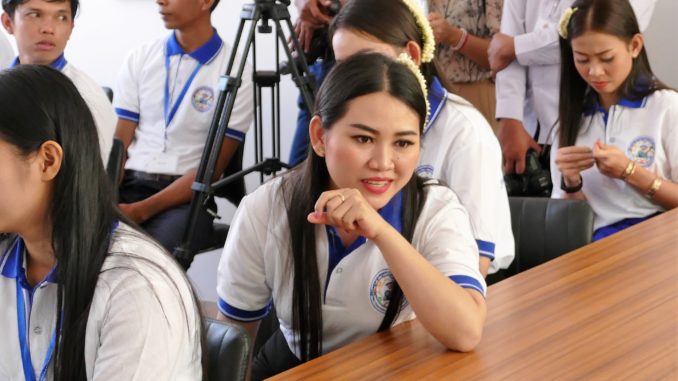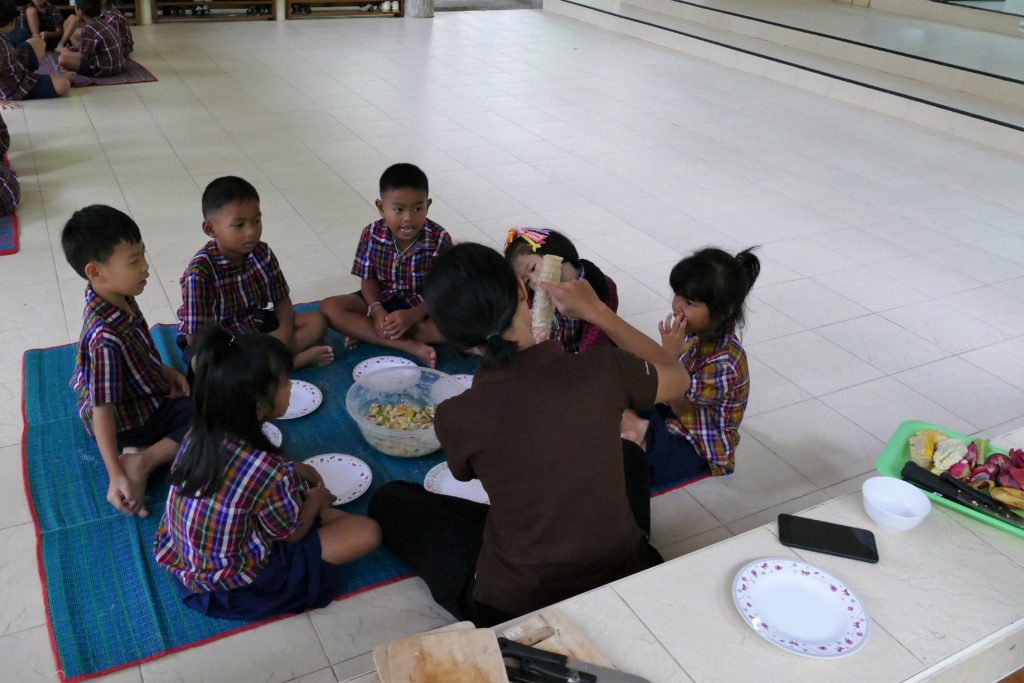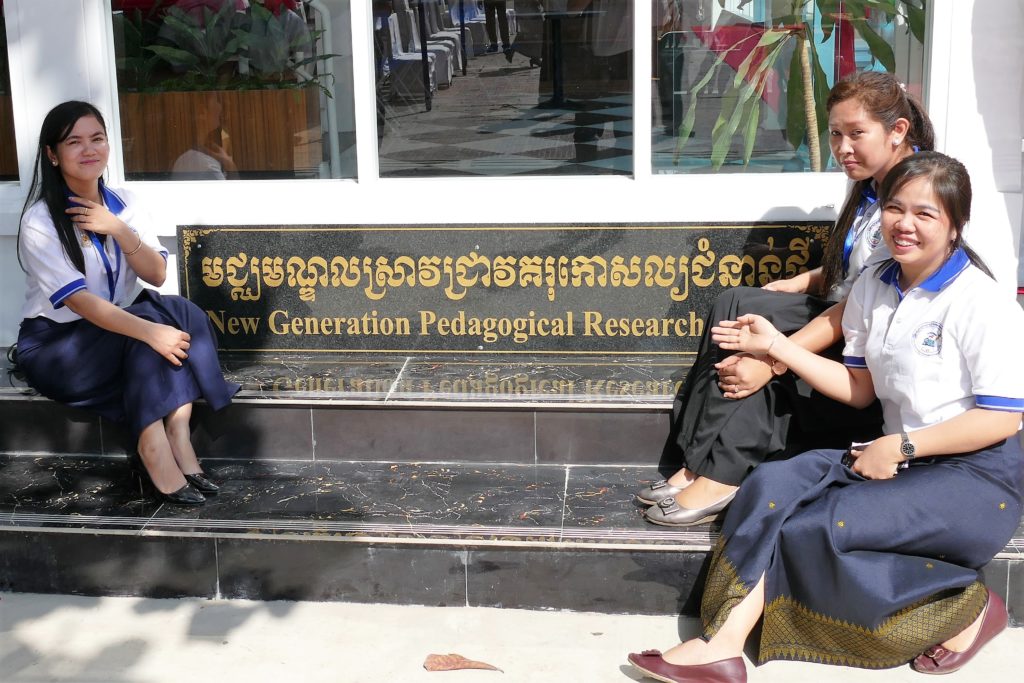
Teacher training is like a bottleneck in educational reforms. It is a difficult endeavor and more than often a frustrating one. One could assume that a good teacher would be able to transfer his skills to other teachers as well, as he is used to pass on knowledge. Sadly, it is far from true.
Adapting to another public
The problem is more acute when we have professional trainers. In many countries, teacher training is the responsibility of specialized professors at university level, whose duty is mainly that, without any actual service in primary or secondary schools. Teacher trainees are the only kind of students they encounter on a daily basis. Some of the trainers have never really taught to a teenager.
This is a problem. Their experience doesn’t match with what the future teachers will encounter.
Young adults have already mastered many social skills that teenagers must still learn, let alone children. They know when to listen to the teacher, they know when to ask questions and all the rules of politeness. In general, they already know how to organize their work, to a decent extent. At least they can maintain the illusion. At least, they can attend a lecture and fake attention.
Moreover, teacher trainees are not just random young adults. They are adults who hold school in high esteem and are selected on their academic performance and their obedience toward the school system. They are graduates who believe in marks and diplomas.
The incentives are totally different for teacher trainees and for K-12 students. The former are volunteers[1] and their future salary is at stake. The latter come to school because it is a legal obligation and they will receive no salary at all. Trainees come with an intrinsic motivation and you just have to build on it. Younger pupils must be convinced first. Way too often, especially in lower secondary, you start the school year in a hostile environment. Trust has already been broken by other teachers, by defiant parents, or by the school system as a whole. Hopefully, it isn’t so much the case in Asia, but it is common in Europe or in the US.
At university, conflicts take different forms than on a primary school playground. The dean of the faculty might have to deal with social justice warriors and other politicized groups. A primary school teacher must judge very important conflicts over marbles. Don’t think it is underneath you. It is very important for moral education.
Time scale
In general, the dean of the faculty is free from the daily problems of discipline. He might have to solve big crisis such as sexual harassment or plagiarism. But they are rare high-stake occurrences, whereas ordinary teachers in lower secondary must deal with routine mischiefs. They work on a totally different time-scale. Addressing a rape attempt requires caution and enquiries, whereas addressing chatters requires immediate decision.
More than often, the training syllabus doesn’t match the real needs of future teachers, or at least, it doesn’t match their immediate concern. When I was a trainee myself, the only response I could obtain to the question of discipline was: “Don’t mistake authority for authoritarianism.” Thank you very much! It will surely help me obtain silence. A teacher who is bullied by his own students won’t listen a thing about Bloom’s taxonomy, lesson plans or student self-esteem, even though those topics might be a part of the solution. He has an emergency.
Problem-solving skill
As a subject-matter, pedagogy isn’t as straightforward as mathematics or physics. It is preparing trainees to whatever problem might occur in the classroom. Although you can predict some of them, many crucial issues cannot be addressed during the training. What matters most isn’t to pass on a bunch of principles, but to create problem-solving abilities and even more the state of mind that is required to make quick, yet wise, decisions. Most subjects can be mastered by obedient learners, but teaching requires leadership. It isn’t the same mindset at all. Sometimes, in order to survived, trainees must unlearn what made them good students.
Trivial skills
A child must be taught how to handle a pen, how to turn the page, and many silly things we never think about, because they seem too obvious. The daily routine of a primary school teacher might involve teaching children how to tie their shoes, how to be clean, and fixing many gruesome incidents with pee or food. None of those are part of the professional experience of a university professor. He might supplement it with common sense or with his experience as a parent, but it is not the same to wash the bottom of your own child and to face the same problem when you oversee 20 children at a time.

As you can figure out, there is a tendency to favor pretty ideas. There are lots of researches about education. They conduct analyses and meta-analyses, comments on comments on the work of great thinkers and great practitioners. But there is little glory in the many little things that make the daily life of an educator. Even worse, there is glory in finding out counterintuitive results. That’s how you make a career as a scientist. It doesn’t mean that you’ll find the truth by looking systematically for surprising results. But it means that you’ll be published. Not every outsider is a Copernic.
As a result, many theories are not only counterintuitive but prevent people to use their common sense. Too many teachers are afraid to say that the king is naked, or just that the theory doesn’t work in their classroom. It has become a dogma. Instead of further investigating the complex issue of motivation and achievement, they keep saying that students shouldn’t repeat a class, even if the poor kids aren’t able to read the first line of their assignment. They choose a side, without critical thinking. Repetition is either bad or necessary. But they don’t question its relevance and the conditions under which it can be effective.
For an effective training, it is not enough to present the last research. It also requires a thorough attention to the context. You need both general and circumstantial knowledge to make a decision. The expert can provide some light on the issue, but ultimately, the decision belongs to the practitioner in the field.
Moving from an intuitive to a conscious level
The doom of knowledge is known to any educator at some point. By this, I mean the fact that a knowledgeable person forgets how he has acquired his knowledge. When his education is complete, everything seems obvious to him. He cannot understand anymore why other people find it difficult. This is even truer for the best intellectuals, who have always been successful. Those who have learned from failure are better armed, even though their résumé isn’t as brilliant.
In the case of outstanding teachers who are asked to train their peers, this problem is aggravated by several factors. Teaching is a multi-level endeavor. It involves many unconscious aspects. Some of them are dealt with by the school board or other stakeholders, so that the teachers don’t have to bother with them, until there is a problem. A lesson that goes smoothly in a school might be a total failure in another school, where working conditions are bad or whose students have a different social background. The school climate is something rather mysterious for a good-willing teacher who has always been used to clarity in social relationship. In order to solve the problem, you must uncover some obscure cause. Maybe you must oppose the school board or another authority, which is excruciatingly difficult for someone who has always lived by the rule.
When you describe your own astonishing technique, you don’t bother to describe the little things that seem obvious or traditional. You only insist on what’s new and prestigious. If you want other people to follow your example, you must elicit what you are doing spontaneously. And it isn’t easy, because many aspects of your practice were never received. You’ve just built your skills because it seemed the right thing to do. Or you’ve learned by imitating your own masters.
Assessing the teachers’ abilities
It is difficult to certify the competence of any worker. In the case of teachers, like any leaders, it is made even more difficult by the number of people involved in their work. You cannot just test them on a machine, like you would do for a factory worker, or make a pen-and-paper test, like you would for an accountant. Any serious simulation would involve 30 children.
Another major difficulty occurs when you try to assess teacher skills in real classroom. Success depends on many things. Some of them doesn’t depend on the teacher’s ability. You cannot just take the passing rate of the students at the exams. The bac II exam evaluates the work of all the teachers a student has had during 12 years or so. It evaluates the action of other educators as well. A child from a rich and well-balanced family is much more likely to perform at school than a child from a poor background, no matter how skilled his teacher is. It is extremely difficult to isolate the action of one specific educator. It’s basically a collective success.
Of course, there are inspections. But those inspections generally come after the teachers have graduated from the training center. And any classroom observation tends to alter the behavior of the participants. The teacher tries to make a state-of-the-art lesson that is very different from his normal practice. Even worse, if the inspection system is politicized or just administratively judgmental, he does the lesson the inspector is supposed to like[2]. The children too change their behavior. They are generally kinder, unless they really hate the teacher. In any case, it is unlikely that an inspector observes the daily problems and practice of the teacher. He is presented with Potemkine classrooms. To solve this problem of sampling, you would need an observer who is more familiar with the school and with the class, so that everybody can act almost normally. You need to build confidence, before you can observe the real teacher. There is a kind of pudor to overcome.
Teachers have needs.
There are a few common points between both kinds of learners, pupils and trainees. They need feedback. They need to be respected as individuals. They have the right to learn from their mistakes. Sadly, many school systems adopt a punitive approach toward young teachers. Trainers and school principals want to avoid problems with parents, voters, and other public authorities. It is terrible to see that a teacher who has already a hard time managing a class of overexcited teenagers is blamed for not being able to control them. Benevolence and self-esteem are not for them. And it isn’t fair. Trainees receive a lot of theory in Institutes of Education, or other Training Centers. But when it comes to practicing, they are basically on their own. They listen to the lesson but do no exercise. And it isn’t fair. It sounds like pedagogical institutions forget all the good principles that every single educator knows. Something is lost in the bureaucratic machine.
The problem of teacher education isn’t so much about the theories that are promoted, be it behaviorism, constructivism, direct instruction or whatever. Each theory of learning and teaching might contribute to the personal reflection of educators. But catastrophe is imbedded in the very structure of the school system, when it prevents them to recover from the inevitable mistakes and frictions that occur in normal practice.
We need a less centralized approach. We need trainers who can observe the realities of each individual class and provide relevant advice. Although the experience of elder educators is widely recognized as the most useful thing to survive the first years of teaching, very little is done to strengthen professional learning communities. We need people who aren’t afraid to share experience and concerns, who are willing to observe and be observed in their classrooms. We need teachers who are still happy to learn, because the lesson isn’t a threat. Receiving feedback on a lesson should become something as normal as correcting the test of your own students. A routine.

School-based mentors
are probably one of the best solutions to create a climate of continuous
learning among the teachers. What would be required for a good mentoring
program? We’d probably need a budgetary effort, to discharge some teachers from
their common duties and incentivize them with their new tasks as mentors. But
it is not necessarily more costly than other strategies. Of course, we need to
choose the mentors wisely, and keep them on actual teaching service for a part
of their time. We need to prepare them for the specific task of mentoring their
peers, as it is not exactly the same as teaching teenagers. But most importantly,
we must empower them with the recognition they need to perform their duty
serenely. No community can work effectively, when there is no trust.
[1] There is much to say about volunteers and obedience. Suffice to say that armies don’t require soldiers to take an oath without reason. According to Stanley Milgram, when people recognize you voluntarily as a legitimate authority, you can make them do terrible things. You don’t even have to use any threat on the salary or anything. You have created a bond between the chief and the subordinate. And that bond is enough to order even immoral actions.
[2] Of course, ordinary teachers have the same problem to a certain extent. Children adapt their responses to the expectations of the adult. But a good teacher takes the necessary time to figure out the truth behind the mask. There is a familiarity that allows the children to lower their guard. If the inspector comes for one hour every five years, he has nothing more than rumors to complete his investigation.
Sure, that’s why a serious training should comprehend a research component, as well as communication tools. We are trying to achieve that in NGPRC. It will take some time, but hopefully, we’ll create good learning communities and we will publish some teaching material as well. Our students already spend a lot of time reading pedagogical books in English. When they become mentors, I hope they will not rely on their personal feelings only.
A less centralized approach is good, but what you learn from certain contexts, you would still need to share it widely so that it can be re-applied. This is where centralization can play the role of disseminating knowledge instead of directing everything.